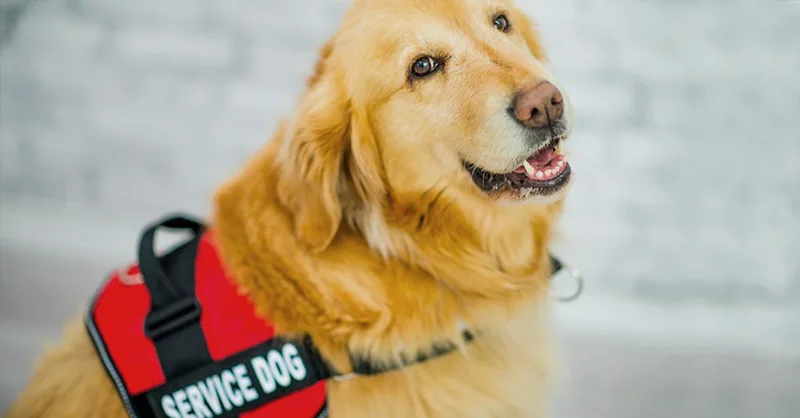Home Page › Blog › Service Dog Certification Guide
Service Dog Certification Guide

If your landlord or an employee at a store asks if your service dog is certified, what exactly does that mean? What precisely do you need to prove you own an actual service dog?
In this guide, we’ll explore 5 things to consider about getting a certified service dog so you can confidently answer if someone asks about your service dog.
#1 – Do you qualify for a service dog?

Service dogs can be incredible companions and helpers for individuals with various disabilities. Here’s a quick rundown of the qualifying criteria for a service dog:
- Having a disability: To be eligible for a service dog, a person must have a physical, sensory, psychiatric, intellectual, or other mental disability that significantly impacts one or more major life activities.
- Requiring assistance related to the disability: The individual needs to benefit from tasks specific to their disability that a service dog could perform.
How do you know if you have a qualifying disability? Under the Americans with Disabilities Act (commonly known as the “ADA”), your condition must be severe enough that it substantially limits a major life activity. If you have a mental health issue and are unsure if you qualify, a PSD letter from your therapist or doctor can be useful.
#2 – Training your service dog to aid in your disability

Professional training organizations: Before you can correctly call your dog a service dog, it must be fully trained to perform a task directly related to your condition. Some organizations offer fully trained service dogs for adoption, but that’s not a realistic option for many people since the cost can run from $20,000 to $60,000.
Alone or with the help of a professional: You’re allowed under the ADA to train a service dog yourself (either on your own or with the help of a professional trainer). Utilizing the services of a good trainer is highly recommended if you lack experience in dog training or if it is difficult for you to do so alone because of your disability.
Service dog tasks for individuals with physical disabilities:
- Mobility assistance: helping individuals stand up, sit down, navigate stairs and uneven terrain; pulling wheelchairs
- Fetching and carrying items: retrieving objects for handlers, carrying items in specially designed backpacks or pouches
- Opening and closing doors: operating door handles, pushing buttons, tugging on ropes to open and close doors
- Alerting to sounds: alerting their handlers with hearing impairments to essential sounds, such as doorbells, smoke alarms, or approaching vehicles
- Obstacle avoidance: helping handlers avoid obstacles in their path, such as furniture, poles, and curbs; steering handlers through crowds
- Intelligent disobedience: refusing a command if it puts their handler in danger
- Emergency assistance: seeking help by finding and alerting others or, if necessary, operating specialized devices, such as emergency call buttons
Service dogs perform a wide range of tasks for the physically disabled. But what about those with psychiatric conditions? Psychiatric service dogs are also called upon to perform an incredible variety of jobs:
- Anxiety and panic attack response: recognizing early signs of anxiety or panic attacks; responding by providing physical comfort, such as nuzzling, leaning against their handler, or placing their head on the person’s lap
- Interrupting harmful behaviors: gently interrupting self-harming behaviors or compulsive actions by nudging or pawing at their handler
- Medication reminders: recognizing the right time and alerting handlers to take medication on schedule
- Nightmare interruption: recognizing signs of distress and waking handlers, especially those with PTSD
- Assistance during dissociation: helping regain focus and awareness by providing tactile stimulation or guiding to a safe space
- Crisis intervention: seeking help when the handler is in severe emotional distress
A bonus for any service dog is their emotional support and companionship. The bond between a handler and their service dog can positively impact the individual’s overall well-being, providing a constant source of comfort and stability.
#3 – Good citizenship and public access training

Public access rights: The ADA gives service dog handlers the privilege of accessing public spaces where animals are typically not permitted. It is the handler’s responsibility to ensure that their service dog remains under their diligent supervision and exhibits exemplary behavior in public settings.
Public access readiness: Before venturing into public environments, it is essential for service dogs to successfully complete a public access test, proving their ability to stay attentive to their handler’s needs and refrain from causing any disturbances in various public surroundings.
Limits to public access: Having a well-behaved service dog that is under your control at all times is essential. If a service dog is acting unruly, aggressive, lunging, barking excessively, or otherwise acting in a dangerous, disruptive, or unsafe manner, it can be asked to leave the premises.
The handler should ensure their service dog can perform its duties in all types of situations, including public environments with many distractions and people.
#4 – Certifying your service dog

Once you have fully trained a service dog for your disability, you can obtain a certificate to recognize your accomplishment. Note that certificates and registrations are not mandated by the ADA, and they are not shortcuts for following proper qualification procedures.
Obtaining certification for your service dog can be useful for several reasons:
- Recognition of training: Certification serves as tangible proof that the service dog has undergone rigorous training to meet specific criteria and standards, ensuring their ability to assist their handler effectively and safely in various situations.
- Public awareness and acceptance: A certified service dog can be more likely to be welcomed and respected in public spaces. The certification demonstrates to others that the dog is trained to behave appropriately and unobtrusively, thus alleviating concerns or misunderstandings. While no one can insist on seeing a certificate as a condition of entry, service dog handlers know that people frequently do this regardless.
- Reduced skepticism and questioning: A service dog with documentation can encounter fewer challenges or inquiries from business owners or the public.
- Enhanced handler confidence: Knowing that their service dog is certified can boost a handler’s confidence in knowing they have done everything the right way to achieve service dog status.
Items like ID cards, vests, and tags fall under the same boat as certifications. They are not necessary but are helpful for service dog owners who want physical tools to signal that their dog is special.
#5 – Verifying your service dog
What should you do if you’re out in public and someone asks if you have a service dog?
Under the ADA, third parties can ask two questions to verbally confirm you have a genuine service dog. Note that if your disability is obviously apparent (for example, if you are in a wheelchair), third parties cannot badger you with these questions.
The two questions that can be asked are:
- Is your dog a service dog required for a disability?
- What work or task has your dog been trained to perform?
Service dog owners have a right to privacy. That means that third parties cannot pester you about the specifics of your health condition or ask that you have your dog perform its task on the spot. These rules are designed to protect the integrity of service dog ownership and preserve the dignity and confidentiality of service dog handlers.
Keep in mind as well that if you are flying with a service dog, the airlines will require certain documents. Take a look at this guide for helpful instructions on how to fly with a service dog.
Latest Posts

How to Bring a Service Dog to Disneyland
Trained service dogs are more than welcome to join their handlers at Disneyland. In this guide, we’ll explain Disneyland’s policies and give practical advice for bringing a service dog to Disneyland for the first time. Disneyland’s Service Dog Policies The Magic Kingdom is happy to welcome trained service dogs across most park locations! They kindly […]

Read More

Can Dogs Eat Tomatoes?
Yes! Dogs can safely enjoy tomatoes, but there are a few risks to be aware of so you can feed your dog responsibly. Fully ripe tomatoes (without the stems and leaves) can actually have nutrients that are good for your pup. Tomatoes have chlorogenic acid, an antioxidant that can have anti-inflammatory effects in cells. They’re […]

Read More

Can a Primary Care Doctor Write an ESA Letter?
Your family doctor, also called a primary care physician (PCP), can write a letter recommending an emotional support animal. We’ll explain what legally gives them that ability and explore what better options might be available for you. Why are Physicians Able to Write an ESA Letter? To turn your pet into an emotional support animal, […]

Read More






I am trying to register my service animal that is fully trained to go on an airplane with me does her registration or certificate come with a D.O.T Service Animal Form
We wrote a guide on the DOT’s Service Animal Form which you can find here: https://www.servicedogcertifications.org/how-to-use-the-dots-service-animal-air-transportation-form-to-board-flights/
I dont have a comment i have a question. I am bi polar have night terrors and sleep apnea. What kind of training would my dog need to be able to be my service dog? She already knows when i am depressed and when i stop breathing at night or when i take a nap she will wake me up and get me to take a breath by licking me. Please what do i need to do to get her registered plus on a fixed income.
Do service dogs them
Selves need to recertify amd if so how many years
Service dog certifictions do not expire. You may find this article on how to get your dog to be a registered service dog interesting: https://www.servicedogcertifications.org/how-to-register-service-dog/
I am a Service Member stationed overseas and about to retire from the service (12 months left). I am currently 80% – 90% disabled. I have a French Bulldog (Bonita) that help me focus on my daily activities and reminds me to take my medications.
She is the “ice breaker” when i start staring at walls. I would like to apply for a serv
One starts with their physician. A prescription from a doctor is required under ADA (Americans with Disabilities Act). Certificate by a government agency or 3rd party organization is not required.
You don’t need a “prescription” or any type of documentation from a doctor in order to own a service dog. You may be thinking of a PSD letter which some owners of psychiatric service dogs obtain. These letters however are not mandated by the ADA. You can read more about PSD letters here: https://www.servicedogcertifications.org/psd-letter/
I get anxiety attack when I am alone in house or work. very nervous and fearful. My dog alerts me if anyone is coming and gives me comfort. I feel safer with her around. How do I get a service certification for her.
when you get a response from a professional, i am following. I also want to get my dog to be a service animal for anxiety but all these websites to get her certified people are telling me they are scams.
Certifying a service dog does not qualify it as a service dog. Certification papers are considered optional service dog paraphernalia. Getting a service dog does not require any specific documentation. The keys are having an eligible disability and a dog that has been trained to assist with that disability. Please see this article on service dog requirements for more details.